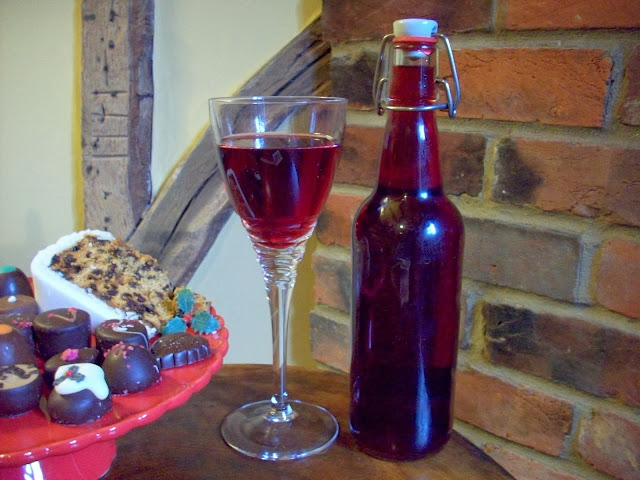THURSDAY, 3 OCTOBER 2013
Hedgerows and Hives (or Sloe Gin, Blackberry Gin & the Attack of the Wasps)
 |
| Being watched while I pick blackberries (by this curious Muntjac Deer) |
I love a September holiday because it lengthens my summer. I tell myself that autumn doesn't arrive until my summer holiday is over - and so, in this household, autumn officially began this year on 22nd September. And it really does feel like autumn now. The nights are drawing in, the Swallows have all left, and leaves are starting to cover the smallholding. We've also begun to bring the logs in and light the fire each evening. I love the fires - but I'd still rather have the long, warm, summer evenings outside.
A downside of taking a September holiday is that I've already missed days of blackberry picking. We eat lots of blackberries throughout the year, so I have to find the time as soon I as come home to pick several tubs-full for freezing. I also have to pick lots of sloes, too, for Sloe Gin, because we love to drink this at Christmas. I posted a recipe for this last September, but I've decided this autumn to make it sweeter by adding more sugar (by increasing the sugar to 1lb) - because each year we seem to like our drinks sweeter and sweeter...
 |
| Last year's Sloe Gin at Christmas |
I've also made some Blackberry Gin. I've not made or even drunk this before, but I like the sound of it. Blackberry Gin is made in a similar way to Sloe Gin, except the blackberries are strained first.
Blackberry Gin
Ingredients:
4lb Ripe Blackberries
3lb Sugar
Gin
Method:
Place the blackberries and sugar in a bowl in a warm place until the juice is drawn from the berries (as a guide, this can take about 8 hours in an airing cupboard).
Strain through a jelly bag/muslin/strainer.
For every pint of juice add a pint of gin. Mix well and bottle.
Store for around 3 months and drink at Christmas!
NB Apparently, if you add a touch of hot water to this it helps to ease a sore throat!!
Fortunately, there's been plenty of sunshine since I came home from holiday, so I've been able to go out into the fields and forage for berries, taking Harry with me. He does get bored by it all, but...lovely dog...he's very patient...
 |
 |
| Small Copper Butterfly |
After blackberries and sloes - apple picking is next - and there are lots of apples this year. We have a large apple crop in the orchard we planted a few years ago...
 |
| A corner of the new apple orchard |
All our trees in the orchard are surrounded by pallets after we acquired lots for free some time ago. These protect the trees from our sheep and the local rabbits - and although they're a bit ugly, they've worked really well.
A few of our neighbours have also very kindly invited us to pick apples from their own trees (as they don't want them), so we're currently doing the rounds of gardens and orchards. But now we have to find a place to store them all. We do have several stacked apple crates, but I'm not sure this will be enough, so the apples that are already beginning to spoil are quickly fed to the sheep, chickens and geese. Most of the good apples will go to make apple juice.
Bees and Wasps
 In late summer, wasps often attack weaker honeybee colonies to steal their honey. All honeybee colonies have guard bees at the entrance of their hive to see off any intruders, but wasps are very persistent and aggressive. While the strong colonies will fight off the wasps, the weaker ones can become overwhelmed.
In late summer, wasps often attack weaker honeybee colonies to steal their honey. All honeybee colonies have guard bees at the entrance of their hive to see off any intruders, but wasps are very persistent and aggressive. While the strong colonies will fight off the wasps, the weaker ones can become overwhelmed.Unfortunately, this is what happened in my apiary this summer.
But, this time, my small colony turned out to be a weak colony - and so it was unable to fight off the wasps.
I discovered what had happened when I lifted the roof off of my nucleus hive expecting bees - only to see a few wasps helping themselves to the honey. I hadn't realised wasps were around the apiary because I hadn't seen them, but there must have been a nest nearby (I had seen them at another apiary and put out lots of jam-jar wasp traps, but I hadn't seen a single wasp around the nucleus hive).
I'm often told that wasps are good for the garden, and that everything in nature has its place, but like other beekeepers, I have another opinion of them altogether...
Grrrrr...................................
A great blog to follow: http://blueborage.blogspot.co.uk/

